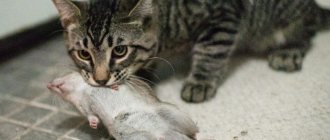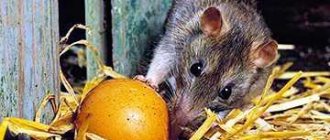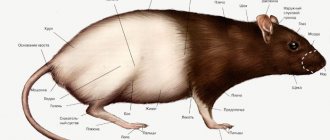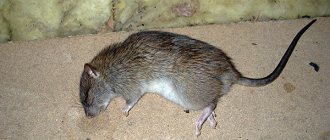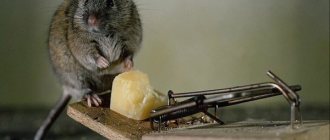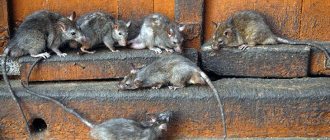Cellars in which vegetable supplies are stored for the winter are favorite habitats for rodents. They not only destroy the harvest, but also spread infectious diseases that are dangerous to humans. Rodents reproduce quickly, so as soon as you notice traces of their vital activity in your storage, immediately declare war on them.
In this article we will tell you whether mice eat potatoes and how to keep potatoes away from rats underground.
Ways to control rodents
There are many techniques that can be used to get rid of pests in the underground. They include both folk methods and achievements of science and technology.
Depending on what kind of rodent has entered the vegetable storehouse, the methods of dealing with it also differ.
With mice
The most popular method of dealing with mice is mechanical, that is, using mousetraps or glue. Both kill the animal.
Mousetraps
This is a universal tool for catching and destroying mice. In order for an animal to fall into a trap, bait is placed in it, which will attract the victim.
Important! Mice do not like human smell and avoid it, so when making traps and bait, use rubber gloves.
The main disadvantage of mousetraps is the limitation on the number of individuals caught. Most often, they are designed for only one mouse, after which the trap will have to be recharged. The maximum number that a modern mousetrap can catch does not exceed 8 mice.
The main advantage of the method is the ability to visually monitor the presence of pests in the cellar.
Glue
The glue does not kill the rodent immediately, but acts as a trap . Glue is applied to a flat surface, such as a sheet of plywood or cardboard, and bait is placed in the middle.
A caught mouse will no longer run away and die somewhere in a hard-to-reach place. The trap should not be kept - after catching the animal, it is thrown away.
Among the disadvantages, the trap is not for the faint of heart: the pest does not die immediately, you will have to watch its slow death or finish it off yourself.
With rats
Methods for exterminating rats are divided into three types:
- chemical;
- mechanical;
- biological.
To achieve your goal and get rid of rodents, it is certainly recommended to use all these methods in a comprehensive manner.
Rat traps
If there are rats in the cellar and they are carrying potatoes, set up special traps or rat traps. To attract them to the trap, just put a fragrant bait.
The advantage of rat traps is their ease of use and quick results. One of the disadvantages is the limitation on the number of rodents caught.
Attention! Rats are even more dangerous and cunning than mice. If they smell a foreign smell of metal, they may ignore the installed trap.
Ultrasound
Ultrasonic repellers are also capable of driving rats out of the cellar. They make a sound that is unpleasant to rats' ears, which forces them to leave their favorite place.
Reference. The undoubted advantage of such repellers is safety for humans and pets.
The advantage of this method is that you do not have to search for and remove dead individuals. But there are also certain disadvantages:
- you will have to wait at least three weeks of continuous use for an effective result;
- Rodents can become accustomed to one frequency, so purchase devices with an adjustment function.
The use of ultrasound is one of the most humane ways to get rid of pests.
Universal methods
There are a number of universal methods suitable for exterminating both mice and rats.
Mechanical methods of rodent control
Mechanical methods, in addition to the mousetraps and traps discussed above, also include various traps and baits.
Place a bucket of water under a shaky ledge. When the rodent, sensing the smell of the piece of cheese left for it, reaches the treat, the bar will turn over under its weight, and the animal will end up in a bucket of water.
Use this method with others to increase their effectiveness. Traps are placed in different places where pests are expected to live.
When making baits, mixtures are used - for example, wheat flour and building gypsum. Such baits, along with saucers of water, are placed throughout the storage facility. Rodents die after eating poison.
Chemistry against mice
According to experts, pesticides are the most effective weapon against rodents. Science offers various drugs:
- instant action - poisons cause hemorrhage, killing the animal almost instantly, the basement pest does not even have time to move far from the bait;
- long-acting - poisons gradually accumulate in the body of rodents, death occurs after about a week;
- mummifying poisons - after death, the animal’s corpse is mummified and does not emit unpleasant odors.
Chemicals are dangerous not only for rats and mice, but also for people and pets. Keep them out of the reach of children and away from food.
Suitable preparations for home use are “Ratsomor”, “Rakusid”, “Zookoumarin” or “Ratindan”.
On a note . Rodents are smart animals, so after the death of several individuals, the survivors will no longer touch the bait.
Loud sounds
Loud sounds are an original way that will help you say goodbye to rodents forever. There are examples when they put an old tape recorder in a vegetable store and played loud music several times every day for about ten minutes. The pests could not withstand such a sound attack and left the cellar.
Strong odors and their effect on mice
Rodents cannot tolerate strong odors. They will be scared away:
- peppermint, wild rosemary or tansy;
- mothballs, vinegar, burnt rubber;
- cinnamon, cilantro, coriander.
All you need to do is place fragrant “bombs” on the floor and you won’t have to catch the rats - they will leave on their own.
Biological “weapons” and pests
The natural enemy of rodents is the cat. But she will only hunt mice if she is hungry. Hedgehogs and some dog breeds, such as fox terriers, will help in the fight against rodents.
Reference. This method is only effective in a small room.
Traditional methods of fighting rats and mice
Folk remedies will help you cope with rats that eat potatoes in the basement.
Among those safe for humans:
- ash - corrodes the paws, and then, getting on the mucous membrane, the stomach;
- crushed wine cork with vegetable oil and bread - under the influence of gastric juice the mixture swells and causes indigestion;
- smoke or sulfur bomb - used while there is no food in the storage.
Important information
It should be noted that today in the markets you can find special repellent devices that are designed specifically for catching rodents. These are ultrasonic repellers that can prevent rodents from appearing in the area that interests you.
This means that you can always purchase such devices, because they are also effective and proven, so in any case, decide what to do. Now you know about all the ways to fight both mice and rats, which means that you need to choose for yourself the most effective options and make sure that now your life will be calm, safe, and there will be no place in it for any then rats and mice.
You now know how to get rid of mice and rats in the cellar. Do not forget about your safety when working with various drugs. There are instructions, but the price is a quiet life without rodents.
How to protect potatoes in the underground from mice and rats
Act quickly, otherwise the rats will eat all the potatoes in the cellar:
- Destroy or remove existing pests using a range of available products.
- Go through all supplies and throw out damaged tubers.
- Seal the cellar as much as possible.
Organize further storage to prevent access of accidentally surviving or newly introduced pests to winter stocks.
Add a comment Cancel reply
You must be logged in to post a comment.
An unknown animal has settled in our garden. We discovered this when we started digging potatoes. You turn out the nest with a shovel, and 3-4 potatoes in it are nibbled.
A parasite unknown to us chooses larger potatoes. Grazes in a certain area. In the ground after him there are passages with a diameter of seven centimeters - the husband has fallen into them more than once. The moves are short, between holes. Could not be traced further.
The other day we held a military council with a neighbor. He also comes across gnawed potatoes and underground passages. Moreover, the neighbor managed to see this pest. True, from afar. According to descriptions, it is a shiny rodent, about 10 centimeters long.
The potato harvest is good now. The damage was relatively small. But now we are afraid that the animal will overwinter, multiply and eat much more, or even leave us completely without root crops.
Eternal questions: who is to blame and what to do?
Anna, s. Dolgoderevenskoe
A mole rat is not a mole
The mole rat mainly lives in the lands of Ukraine, Western Ciscaucasia and some southern regions of Russia. However, the rodent is increasingly being spotted much further north, for example, in the Southern Urals. He is actively developing new lands and spoiling the harvest. The main delicacy of mole rats is potato, carrot and beet tubers.
Is it possible to eat potatoes chewed by mice?
After you destroy the pests, do not forget to carefully sort through the potatoes, discarding damaged tubers. They cannot be eaten.
Important! This work is carried out with rubber gloves to eliminate the risk of getting a dangerous infection.
SES specialists explain that potatoes that have been lightly nibbled by rats must be thoroughly washed and boiled. Only after heat treatment can it be eaten. If the tubers are thoroughly spoiled, it is better not to risk your health and throw them away.
Why do you need to get rid of moles?
It would seem, what harm can a small animal up to 17 cm long do, since it destroys mole crickets and other enemies of the garden. But it's not that simple. Here are a few factors that will make you think about the harmlessness of mammals and find a good method for moles:
- In addition to mole crickets and wireworms, the animals are not averse to eating earthworms. And they are extremely necessary for loosening and aerating the soil.
- Rats and mice often live in molehills. One pair of individuals calmly digs up to 20 m of new tunnels a day, which means that other rodents will soon appear on the site.
- In the process of digging, moles tear apart everything that comes under their paws with powerful claws. And it’s good if these are the roots of weeds, and not fruit trees or an electricity supply cable, a PVC water pipe.
- In the process of digging, moles lift infertile soil to the top, reducing the nutritional value of the soil.
- The mole's nest can be buried down to 1.5-2 m. There is no point in filling molehills and passages - the family will move to one of the dead ends and survive. Without food, individuals survive up to 17 hours.
- In one night, a pair of pests can “plow up” a garden area of up to 4 acres.
- In winter, moles do not sleep. Slightly reducing their activity, they continue to harm the garden. During a season, a female can bring up to 2 litters, which will also harm the gardener.
It is strictly unacceptable to handle an animal without protective gloves. Sharp claws on their paws can seriously damage the skin, and moles bite well. In addition to dirt, saliva can get into the wound, through which it is easy to become infected with helminths, cholera, and plague.
Prevention of rodents
Getting rid of rodents is difficult. They have already adapted to all human tricks and are very tenacious. Therefore, it is easier to carry out preventive work to create unfavorable conditions for rodents than to fight them in the future.
As preventive measures we recommend:
- concrete the floor;
- cover all the cracks;
- install a metal door;
- glaze the windows;
- remove trash;
- make sure that the holes in the ventilation are no more than 50 mm.
These measures are aimed at preventing rodents from entering the cellar. It will not be possible to get rid of them if the pests have already entered the storage facility.
This is interesting:
Features of storing potatoes in a garage without a cellar.
How and when to dig potatoes for storage.
How to make a potato storage box with your own hands.
Preventive measures
When the owner, having visited the cellar, discovers that the mice in the cellar are gnawing potatoes and spoiling food and things stored for the winter, digging passages in the walls and making nests to hatch out the little mice, then he will be faced with the problem of taking urgent measures to destroy them. You can worry in advance and prepare the cellar for winter.
Before the start of the winter season, before filling the cellar with food, it is recommended to take preventive measures that will help prevent rodents from entering the basement:
- It is better to cover the doors to the cellar with a metal sheet;
- cover the ventilation outlets with mesh or metal with small holes; it should be taken into account that small mice are quite capable of crawling into small holes the diameter of a pencil;
- If possible, close all products in airtight containers with tight-fitting lids.
All these measures will be effective only if the cellar has concrete or brick walls through which rodents cannot crawl.
Folk recipes
You can remove rats from the basement using folk remedies as quickly as using store-bought poison. To do this, you need to know what rats are afraid of.
- Ash drives rats out of the cellar, destroys harmful insects, and does not threaten human life. Sprinkle a thin layer over the entire floor of the cellar or along the walls. The ash sticks to the paws and stomach, irritates the skin, and causes a terrible burning sensation. The rat tries to get rid of the pollution, the ash ends up in the stomach. Intestinal upset appears. Pain drives the rodent out of the room; repeated repetition of the situation forces the rodent to look for a new place to live.
- In the basement of a private house, you can get rid of rats with flour and plaster of Paris. A reliable method with minimal costs. Mix in equal proportions and place in a shallow container. When gypsum gets inside, it hardens. Along with it are the internal organs. To make the process go faster, place a container of water in close proximity.
- If there is a rat in the cellar, you can drive it out with specific odors. The rodent cannot tolerate strong aromas. Moisten a rag in kerosene, ammonia, naphthalene, or solvent. Lay out on the floor. You can remove rodents with peppermint, garlic, and pine.
- The rat in the basement is constantly looking for food. You can treat her to a fragrant wine cork fried in lard. It should be crushed first. Give the rodent a treat. The plug in the stomach will begin to swell, lead to significant deformation of the internal organs, and block breathing.
If the rats bypass the poison and do not fall into traps, you can build a trap out of water. Take liquid into a deep container, spread straw on top, pour a few tablespoons of sunflower oil. Scatter wheat grains in the center. Place a ladder to the container. You can catch the biggest rat in a bucket.
Repellent
Ultrasonic devices are used as deterrents, although many “mouse hunters” complain about their ineffectiveness. In addition, to work effectively, the repeller must meet certain requirements:
- firstly, be constantly connected to the electrical network;
- secondly, it is necessary to periodically change the sound frequency (in some devices the option is automatic);
- thirdly, it does not work as intended in rooms with many partitions, since the sound is reflected from them and may not reach the recipient’s ears;
- fourthly, low air temperatures negatively affect the stability of the device.
According to reviews, ultrasonic repellers Typhoon, Elektrokot and Grad have proven themselves well, but only if they are used correctly. Plugging the device into the outlet once will not help - it must work for at least three weeks without interruption.
You can also use unpleasant odors: mothballs, vinegar, blackroot grass, burnt tires, etc.
Unfortunately, it is unlikely that you will be able to get rid of mice in the garage forever: after some are driven out, others will definitely come to take their place. But you shouldn’t despair, and if none of the methods described above helps, the animals continue to pester you, then they fight pests in all possible ways - something will definitely help!
Biological destruction
Now you can connect heavy artillery. The simplest and most effective way is deratization: using a special mouse poison. It is laid out in corners, along walls, on horizontal surfaces
Particular attention is paid to places from which hordes of mice crawl out.
It is logical to assume that only adults will die from the poison, but this is not a reason for concern: mouse offspring without parents will not last long.
When working with poison, do not forget about your own safety:
- protect hands with rubber gloves;
- do not smoke or eat;
- Afterwards, be sure to throw the gloves in the trash and wash your hands with soap.
Important! All found corpses of dead animals are collected (this must also be done with gloves) and destroyed by burning; in extreme cases, they are buried in a vacant lot, having previously been sprinkled with bleach. Such simple actions will prevent the spread of possible infectious diseases carried by rodents
Such simple actions will prevent the spread of possible infectious diseases carried by rodents.
Eliminate odor
An unpleasant “aroma” can persist in the house for a long time, even after the rodents have been completely destroyed. Dealing with him is not so easy. Mice excrement contains ammonia. It is this, together with other components, that creates a terrible aroma. The persistence of the smell is explained very simply. Ammonia can quickly penetrate wood, walls, and plastic. That is why getting rid of the “aroma” is very problematic, but possible. To do this, follow three steps.
- Cleaning the premises. After killing the mice, do a general cleaning and sweep up the excrement. Clean all corners thoroughly.
- Wash with vinegar and bleach. Pour 9% vinegar (100 ml) into a bucket of water (5 liters). Using the resulting solution, thoroughly wash all surfaces, floors, baseboards, and, if possible, walls. Additionally, wash the room with a bleach solution (10 ml of chlorine per 5 liters of water).
- Masking the smell. Use deodorizing or odor-absorbing antibacterial solutions, which are sold in specialty stores.
Don't forget about another effective method to remove mice. Get Tom, who will instantly drive away the uninvited Jerry. If a new “tenant” is not included in your plans, rent a cat (or better yet, a cat) from friends.

